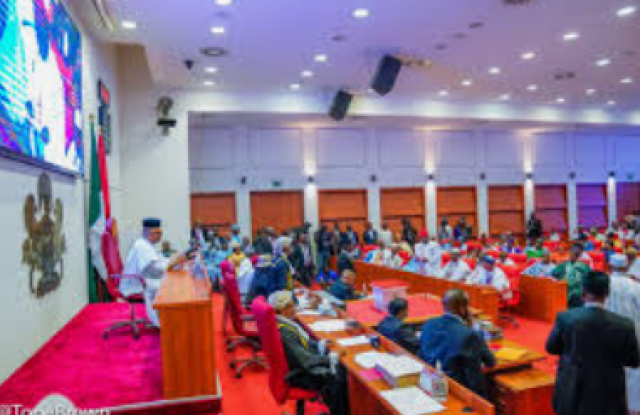The Senate initiated an extensive investigation into the surge of Ponzi schemes across the nation, on Wednesday, triggered by the devastating collapse of Crypto Bridge Exchange, a digital investment service that reportedly defrauded Nigerians of over N1.3 trillion.
This Ponzi scheme is regarded as one of the most significant financial frauds in the country's history. Senators attributed the increase in Ponzi-style investments to failures in regulation and inadequate financial oversight, cautioning that the ensuing consequences—including increased suicide rates and a rise in public distrust—now pose a threat to Nigeria’s social and economic stability.
The motion, co-sponsored by Senators Tokunbo Abiru from Lagos East and Osita Izunaso from Imo West, received unanimous backing on the Senate floor, with lawmakers from various political parties denouncing the systemic failures that permitted such platforms to operate without accountability.
Presenting the motion, Abiru outlined how CBEX took advantage of the weak regulatory supervision by the Central Bank of Nigeria, the Securities and Exchange Commission, the Nigerian Financial Intelligence Unit, and the Economic and Financial Crimes Commission to ensnare millions of Nigerians into a financial trap.
He stated, “Over N1.3tn was lost to CBEX alone. This is not an isolated incident; it is part of a troubling trend that started with MMM in 2016 and MBA Forex in 2020. Nigerians are being continuously defrauded.”
He also cautioned that the repercussions include mental health issues, suicides, and a crippling distrust in legitimate financial institutions.
Senator Tahir Monguno from Borno North characterized the situation as “alarming,” insisting, “We must strengthen our laws and ensure that perpetrators face the full consequences. Enough is enough.”
Supporting the motion, Senator Sadiq Umar from Kwara North remarked that the Nigerian populace has been let down by the institutions designed to safeguard them. “Regulatory bodies must awaken. People rely on them to act—not to be dormant,” he stated.
Senator Solomon Adeola from Ogun West warned that the issue extends beyond Ponzi schemes, stating, “We are now witnessing unlicensed fintech companies masquerading as digital innovations.
The CBN needs to clarify what protections are in place and how many of these platforms have been adequately reviewed.”
Senator Abdul Ningi from Bauchi Central urged the National Assembly to use its constitutional authority under Sections 88 and 14 of the 1999 Constitution to hold regulatory agencies accountable.
Reflecting on the issue, Senate President Godswill Akpabio disclosed that he had once been a victim of a failed Ponzi scheme in Port Harcourt, Rivers State, during the 1990s.
“History is repeating itself, now with even more catastrophic implications,” Akpabio stated. “N1.3tn lost—just like that. This is an emergency. Families have been devastated. Lives have been lost. We must take decisive action quickly.”
He endorsed calls for public hearings and nationwide financial education initiatives, warning: “We cannot remain passive while Nigerians are being defrauded. Urgent action is needed to prevent more suicides, rebuild trust, and restore our economy from these digital predators.”
The Senate resolved to commence a multi-committee investigation that will involve its Committees on Capital Market; Banking, Insurance and Other Financial Institutions; Anti-Corruption and Financial Crimes; and ICT & Cybersecurity.
The leading committee is expected to conduct public investigative hearings and provide its findings within four weeks.
The upper chamber noted that the inquiry will encompass more than just CBEX, aiming to broadly assess Nigeria’s digital financial landscape to identify systemic flaws and recommend extensive legal and regulatory reforms.




















